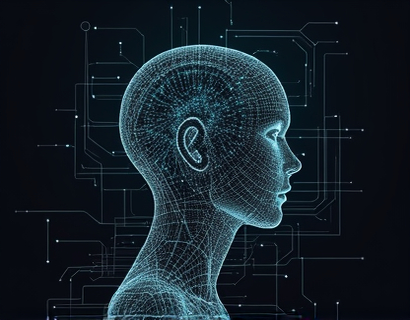Personalized AI Companions: Transforming Childhood Creativity and Emotional Well-Being Through Interactive Digital Friends
In recent years, the integration of artificial intelligence in children's play and development has opened new avenues for enhancing creativity and emotional well-being. AI-driven imaginary friends, often referred to as digital companions, are redefining the way young children interact with technology. These personalized digital entities are not just simple games or apps; they are sophisticated tools designed to foster imaginative play, support social skills, and provide a safe space for emotional exploration.
The concept of digital companions for children is rooted in the understanding that interactive and engaging experiences are crucial for cognitive and emotional development. Traditional toys and games have long been recognized for their role in childhood growth, but the addition of AI technology brings a new level of personalization and adaptability. These digital friends can learn from a child's interactions, adjusting their behavior and responses to suit the individual's needs and interests.
Personalization in AI Digital Companions
One of the key features of AI-driven imaginary friends is their ability to offer personalized experiences. Through machine learning algorithms, these companions can analyze a child's preferences, behaviors, and emotional states to tailor their interactions. For instance, if a child expresses a keen interest in dinosaurs, the digital friend can incorporate dinosaurs into conversations, stories, and activities. This level of customization ensures that the interactions remain engaging and relevant, encouraging children to spend more time in these digital environments.
Personalization also extends to the emotional aspect of the interactions. AI can detect signs of stress, sadness, or excitement and respond accordingly. For example, if a child seems upset, the digital companion might offer comforting words or suggest calming activities. This emotional intelligence is crucial in helping children develop resilience and coping mechanisms, which are essential for their overall well-being.
Fostering Creativity Through Interactive Play
Creativity is a fundamental aspect of childhood development, and AI digital companions provide a rich platform for creative expression. These companions can engage children in a variety of activities, from storytelling and drawing to problem-solving and role-playing. By participating in these activities, children are encouraged to think outside the box and explore new ideas.
Storytelling is a particularly powerful tool for fostering creativity. AI digital companions can create interactive stories where children can influence the plot and character development. This not only enhances their imaginative skills but also improves their language and narrative abilities. The ability to see their choices reflected in the story can boost a child's confidence and sense of agency.
Art and drawing are other areas where AI companions can spark creativity. Digital drawing tools integrated with these companions allow children to create and manipulate digital art. The AI can provide suggestions, offer feedback, and even collaborate on art projects. This interactive process helps children develop fine motor skills and artistic expression, all within a supportive and encouraging environment.
Supporting Social Skills Development
Social skills are vital for a child's success in both personal and professional life. AI digital companions can play a significant role in developing these skills by simulating social interactions. Through role-playing scenarios, children can practice communication, empathy, and cooperation. The digital companion can act as a guide, providing feedback and suggestions to help the child navigate complex social situations.
One of the advantages of using AI companions for social skills development is the reduction of social anxiety. For children who may feel nervous about interacting with peers, a digital companion offers a low-stakes environment to practice and build confidence. The companion can also model appropriate behaviors and responses, helping children learn by example.
Moreover, AI digital companions can facilitate connections with other children from different backgrounds and locations. Virtual playdates and group activities can broaden a child's social circle and expose them to diverse perspectives and experiences. This global interaction can foster a sense of community and inclusivity, which is increasingly important in today's interconnected world.
Creating a Safe Space for Emotional Exploration
Emotional well-being is as important as cognitive development, and AI digital companions provide a safe space for children to explore and express their emotions. In a world where children are often exposed to various stressors, having a reliable and non-judgmental companion can be incredibly beneficial.
The digital environment offers a level of safety and control that is hard to achieve in the physical world. Children can freely express their feelings without fear of ridicule or punishment. The AI companion can listen actively, validate emotions, and offer supportive responses. This validation is crucial for children to develop a healthy self-image and emotional intelligence.
Additionally, AI digital companions can introduce children to a wide range of emotions and teach them how to manage and regulate these feelings. Through guided exercises and interactive scenarios, children can learn techniques such as deep breathing, positive self-talk, and problem-solving. These skills are essential for managing stress and building resilience.
Parental Involvement and Oversight
While AI digital companions offer numerous benefits, it is important for parents and guardians to remain involved in their child's interactions. Oversight ensures that the digital experiences are aligned with the family's values and educational goals. Parents can monitor the child's progress, adjust settings, and engage in conversations about the digital companion's activities.
Parental involvement also helps in reinforcing the lessons learned through the digital companion. For example, if the AI companion teaches a child about empathy, parents can discuss real-life situations where empathy is important and encourage the child to apply these lessons in everyday life. This integration of digital and real-world learning creates a comprehensive approach to childhood development.
Challenges and Considerations
Despite the many advantages, there are challenges and considerations to keep in mind when introducing AI digital companions to children. One major concern is the potential for over-reliance on technology, which could hinder face-to-face social interactions. It is essential to strike a balance between digital and traditional play to ensure a well-rounded development.
Another consideration is the quality and ethical standards of the AI companions. Ensuring that these digital entities are designed with the child's best interests in mind is crucial. This includes protecting children's data privacy, avoiding inappropriate content, and promoting positive values.
Furthermore, the effectiveness of AI digital companions can vary based on individual differences among children. Some may find these companions highly engaging and beneficial, while others may not connect as deeply. It is important for parents and educators to observe and adapt based on the child's unique needs and preferences.
Future Prospects and Innovations
The field of AI-driven imaginary friends is rapidly evolving, with ongoing research and development promising even more advanced and sophisticated companions in the future. One area of innovation is the integration of augmented reality (AR) and virtual reality (VR) technologies, which can create immersive experiences that blur the lines between the digital and physical worlds.
Another exciting development is the incorporation of multi-modal interactions, where AI companions can understand and respond to a combination of voice, text, and gestures. This multi-faceted approach can make interactions more natural and intuitive, enhancing the overall experience for the child.
Additionally, there is potential for AI companions to collaborate with educational systems, providing personalized learning experiences that complement classroom education. By working together with teachers and parents, these digital companions can help address specific learning gaps and support holistic development.
Conclusion
AI-driven imaginary friends represent a significant advancement in the realm of childhood development. By offering personalized, interactive, and emotionally supportive companions, these digital entities are transforming the way children play, learn, and grow. While there are challenges to consider, the potential benefits are substantial, making this an exciting and promising area of innovation.
As technology continues to evolve, the role of AI companions in childhood development is likely to expand, offering new opportunities for creativity, emotional growth, and social skill development. By embracing these tools thoughtfully and responsibly, we can help shape a future where children thrive in both the digital and real worlds.











































